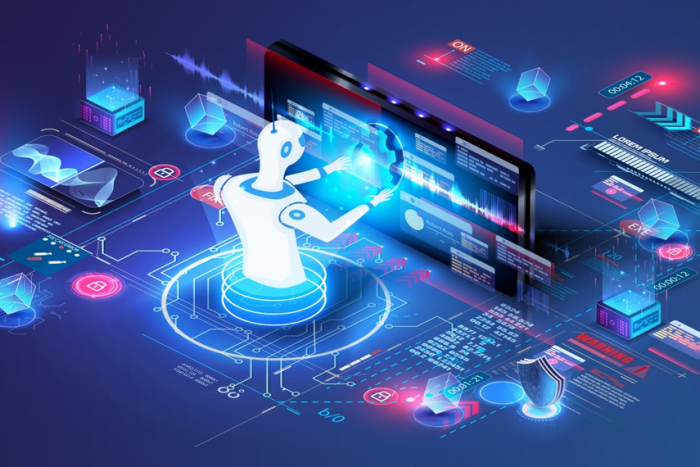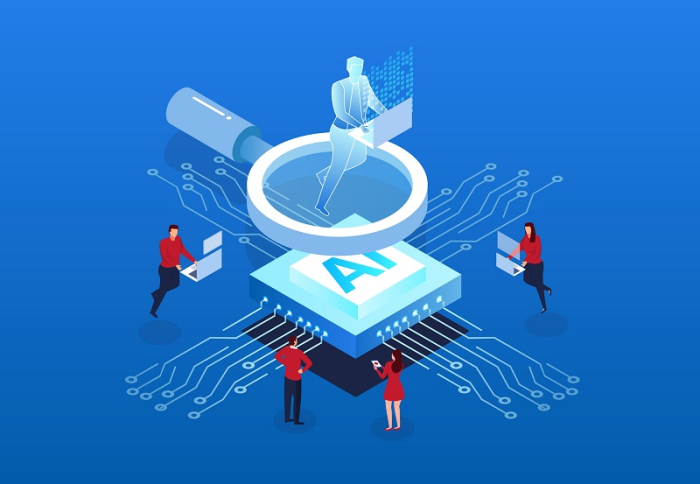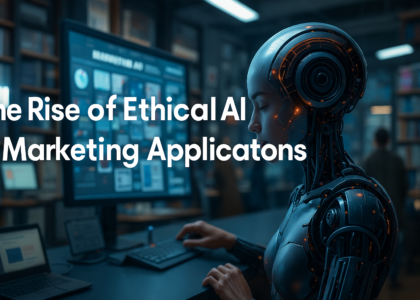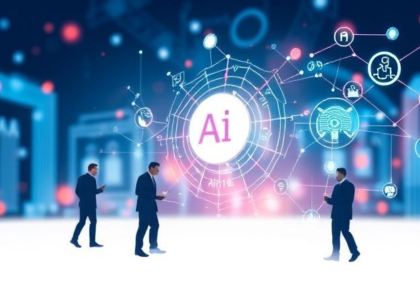
Artificial intelligence (AI) has become a buzzword in the marketing world, promising to revolutionize how businesses connect with their audiences. From automating routine tasks to delivering personalized experiences, AI offers a range of capabilities that can significantly enhance marketing efforts. However, as with any emerging technology, AI in marketing is surrounded by several misconceptions. These myths can lead to unrealistic expectations or even hesitation to adopt AI tools. In this article, we’ll debunk some of the most common misconceptions about AI in marketing, providing a clearer understanding of its true potential and limitations.
Misconception 1: AI Will Replace Human Marketers
One of the most widespread fears is that AI will take over the jobs of human marketers. While AI can automate certain tasks, it cannot replace the creativity, strategic thinking, and emotional intelligence that human marketers bring to the table. AI excels at processing large amounts of data and performing repetitive tasks, freeing up marketers to focus on more complex and creative aspects of their roles.
In reality, AI serves as a powerful assistant, enhancing the work of human marketers rather than replacing them. It can handle tasks like data analysis, predictive modeling, and even content generation, but it still requires human oversight to ensure that the output aligns with the brand’s voice and strategic goals. Rather than fearing AI, marketers should see it as a tool that can amplify their efforts and improve efficiency.
Misconception 2: AI Is Only for Big Companies
Another common misconception is that AI is a luxury reserved for large enterprises with massive budgets. While it’s true that early AI technologies were expensive and complex, the landscape has changed dramatically in recent years. Today, there are AI tools available at various price points, many of which are specifically designed for small and medium-sized businesses (SMBs).
Cloud-based AI solutions and software-as-a-service (SaaS) platforms have made AI accessible to companies of all sizes. These tools are often user-friendly and don’t require extensive technical knowledge, making it easier for smaller businesses to implement AI-driven marketing strategies. Whether it’s AI-powered email marketing, customer segmentation, or social media management, there are affordable options that can help SMBs compete with larger competitors.
Misconception 3: AI Can Instantly Solve All Marketing Problems
Some marketers may believe that AI is a silver bullet that can instantly solve all of their marketing challenges. While AI is a powerful tool, it’s not a magic solution. Implementing AI effectively requires time, effort, and a clear understanding of your business objectives. AI systems need quality data to function properly, and they often require continuous monitoring and optimization.
AI can help marketers identify trends, predict customer behavior, and optimize campaigns, but it cannot replace the need for a solid marketing strategy. Marketers must still define their goals, understand their audience, and craft compelling messages. AI can enhance these efforts by providing insights and automating certain tasks, but it should be seen as a complement to, not a replacement for, traditional marketing strategies.
Misconception 4: AI Is Impersonal and Will Alienate Customers
There’s a concern that AI-driven marketing is too impersonal and may lead to a loss of connection with customers. However, when used correctly, AI can actually enhance personalization and improve the customer experience. AI can analyze vast amounts of data to understand customer preferences and behaviors, enabling marketers to deliver highly targeted and relevant content.
For example, AI can personalize email campaigns by tailoring messages to individual recipients based on their past interactions with the brand. It can also optimize the timing of communications to increase engagement. Far from being impersonal, AI can help marketers create more meaningful and personalized experiences that resonate with customers on a deeper level.
Misconception 5: AI Requires Advanced Technical Skills
Many marketers are hesitant to adopt AI because they believe it requires advanced technical skills or a deep understanding of machine learning. While developing AI models from scratch does require specialized knowledge, most AI marketing tools are designed to be user-friendly and accessible to non-technical users.
Modern AI platforms often come with intuitive interfaces that allow marketers to input data, set parameters, and interpret results without needing to understand the underlying algorithms. Many tools also offer support and tutorials to help users get started. As a result, marketers with little to no technical background can still leverage AI to enhance their campaigns and achieve better results.
Misconception 6: AI Will Lead to Privacy Violations
With the increasing focus on data privacy, there’s a concern that AI will exacerbate privacy issues by collecting and using personal data inappropriately. However, AI can be used in a manner that respects privacy and complies with regulations like the General Data Protection Regulation (GDPR) or the California Consumer Privacy Act (CCPA).
AI can actually help marketers manage privacy more effectively by automating compliance processes, such as anonymizing data or managing consent preferences. It’s important for companies to be transparent about how they use AI and ensure that they have robust data protection measures in place. When used responsibly, AI can help marketers deliver personalized experiences without compromising customer privacy.

Their marketing efforts, regardless of the campaign size. For smaller campaigns, AI can optimize budgets by identifying the most effective channels and content types, ensuring that every dollar spent yields the highest possible return. It can also help in creating highly personalized experiences for niche audiences, something that is particularly valuable for small businesses looking to build strong customer relationships.
For example, an AI-driven tool can help a small business analyze customer behavior to determine the best time to send emails, which products to recommend, or which social media posts are most likely to engage their audience. This level of precision can make even a small campaign more impactful, proving that AI is not just for the big players but a versatile tool for marketers at every level.
Misconception 8: AI Will Make Marketing Less Creative
Some marketers worry that relying on AI will stifle creativity, reducing campaigns to formulaic, data-driven efforts devoid of human imagination. While AI does rely on data and algorithms, it doesn’t replace the need for creative thinking—instead, it can enhance it.
AI can handle the more analytical and repetitive aspects of marketing, such as testing different headlines, analyzing audience responses, or optimizing ad placements. This frees up marketers to focus on the creative aspects, such as developing compelling narratives, designing visually engaging content, and coming up with innovative ideas that resonate emotionally with audiences.
Moreover, AI can actually inspire creativity by providing insights into what content formats, themes, or messages are resonating with audiences. For instance, by analyzing trends and audience behavior, AI can help marketers brainstorm new content ideas that align with what their target audience is currently interested in. Therefore, rather than limiting creativity, AI can act as a catalyst that enables marketers to be more inventive and innovative.
Misconception 9: AI Takes Away the Human Element of Marketing
A significant concern is that AI-driven marketing will feel cold and robotic, lacking the human touch that is so crucial to building brand loyalty and trust. However, when used correctly, AI can actually enhance the human element of marketing by enabling more personalized and meaningful interactions with customers.
AI tools can analyze customer data to deliver personalized content, recommendations, and experiences that feel tailored to individual needs and preferences. For example, AI can help create personalized email campaigns that address the recipient by name, recommend products based on their previous purchases, or provide content that aligns with their interests. This level of personalization can make customers feel understood and valued, deepening their connection with the brand.
Additionally, AI can assist in real-time customer interactions through chatbots that can answer questions, provide support, and guide users through the purchase process. While these interactions are powered by AI, they can be designed to feel human-like, offering a seamless and positive customer experience.
Misconception 10: AI Is Too Complex to Implement
Finally, there’s a common belief that implementing AI in marketing is too complex and requires a deep understanding of technology, leading many marketers to avoid it altogether. While AI does involve sophisticated algorithms and data processing, the tools available today are designed to be user-friendly and accessible.
Many AI-powered marketing platforms come with intuitive interfaces that allow marketers to easily integrate AI into their existing workflows without needing to learn complex programming languages or data science. These platforms often include step-by-step guides, tutorials, and customer support to help users get started and maximize the benefits of AI.
Moreover, marketers don’t need to implement AI across every aspect of their strategy all at once. It’s possible to start small—such as using AI for email marketing or social media management—and gradually expand its use as they become more comfortable with the technology. This incremental approach allows businesses to adopt AI at their own pace, minimizing disruption and complexity.
Final Thoughts
AI is transforming the marketing landscape, offering powerful tools that can enhance efficiency, personalization, and creativity. However, to fully leverage the benefits of AI, marketers need to dispel the myths and misconceptions that surround it. By understanding what AI can and cannot do, businesses can make informed decisions about how to incorporate it into their strategies effectively.
Rather than viewing AI as a threat or a complex challenge, marketers should see it as an opportunity to enhance their efforts, reach their audiences more effectively, and achieve better results. As AI technology continues to evolve, those who embrace it with a clear, informed perspective will be best positioned to succeed in the ever-changing world of marketing.




